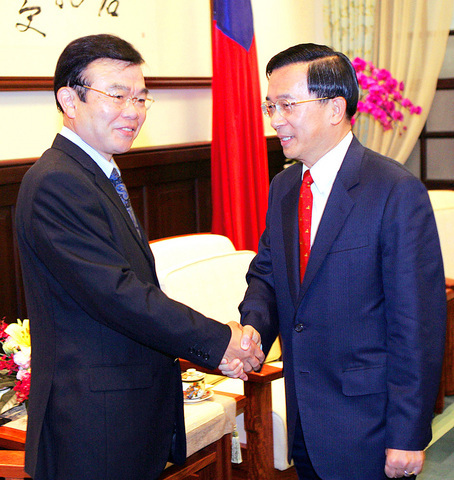President Chen Shui-bian (陳水扁) yesterday rejected the idea of signing a Closer Economic Partnership Arrangement (CEPA) with China, saying it would be "unacceptable" to sign such an agreement as it would downgrade the nation's status to that of Hong Kong and Macau.
"If China signs a CEPA with Taiwan, it would undoubtedly demean Taiwan and turn it into a special administrative region, turn it into a second Hong Kong or a second Macau. This is something we absolutely cannot accept," Chen said.
His comments came the same day as Chinese Nationalist Party (KMT) Chairman Lien Chan (連戰) met with Chinese President Hu Jintao (胡錦濤) in Beijing. It had been widely reported that Hu was ready to tell Lien that China was willing to sign a CEPA with Taiwan.

PHOTO: AP
At a Beijing news conference yesterday afternoon following a two-hour meeting between Lien and Hu, KMT spokesman Chang Jung-kung (
Although Chang did not elaborate, observers said a common market could mean a CEPA.
The CEPAs China has signed with Hong Kong and Macau allow Beijing to grant privileged treatment to the two Special Administrative Regions (SARs). Under the CEPAs, which took effect on Jan. 1 last year, more than 100 categories of products are allowed to enter China duty-free.
Since both Taiwan and China are WTO members, Chen said they should sign a free-trade agreement (FTA) and use the WTO as a platform to conduct bilateral trade and economic exchanges.
"Under the WTO's framework, if there's anything that should be signed between China and Taiwan, it should be an FTA and not a CEPA," he told a delegation of pro-Taiwan Diet members from Japan's Democratic Party.
"We will be thankful enough if China does not oppose other countries signing FTAs with Taiwan. Let's not play games about `signing a CEPA,'" Chen said.
He said that Taiwan looked forward to signing an FTA with Japan. He also expressed condolences for the deadly train crash last Monday and thanked the Japanese government for its concern over China's "Anti-Secession" Law.
While Chen was occupied meeting foreign visitors yesterday morning and afternoon, senior Presidential Office officials kept a close watch on TV coverage of Lien's meeting with Hu.
A meeting of high-ranking Cabinet and Democratic Progressive Party caucus officials was convened last night by Presidential Office Secretary-General Yu Shyi-kun at the Presidential Office.
At press time last night the Presidential Office had decided not to issue any official comment on Lien's remarks in Beijing.

MAKING WAVES: China’s maritime militia could become a nontraditional threat in war, clogging up shipping lanes to prevent US or Japanese intervention, a report said About 1,900 Chinese ships flying flags of convenience and fishing vessels that participated in China’s military exercises around Taiwan last month and in January last year have been listed for monitoring, Coast Guard Administration (CGA) Deputy Director-General Hsieh Ching-chin (謝慶欽) said yesterday. Following amendments to the Commercial Port Act (商港法) and the Law of Ships (船舶法) last month, the CGA can designate possible berthing areas or deny ports of call for vessels suspected of loitering around areas where undersea cables can be accessed, Oceans Affairs Council Minister Kuan Bi-ling (管碧玲) said. The list of suspected ships, originally 300, had risen to about

DAREDEVIL: Honnold said it had always been a dream of his to climb Taipei 101, while a Netflix producer said the skyscraper was ‘a real icon of this country’ US climber Alex Honnold yesterday took on Taiwan’s tallest building, becoming the first person to scale Taipei 101 without a rope, harness or safety net. Hundreds of spectators gathered at the base of the 101-story skyscraper to watch Honnold, 40, embark on his daredevil feat, which was also broadcast live on Netflix. Dressed in a red T-shirt and yellow custom-made climbing shoes, Honnold swiftly moved up the southeast face of the glass and steel building. At one point, he stepped onto a platform midway up to wave down at fans and onlookers who were taking photos. People watching from inside

Japan’s strategic alliance with the US would collapse if Tokyo were to turn away from a conflict in Taiwan, Japanese Prime Minister Sanae Takaichi said yesterday, but distanced herself from previous comments that suggested a possible military response in such an event. Takaichi expressed her latest views on a nationally broadcast TV program late on Monday, where an opposition party leader criticized her for igniting tensions with China with the earlier remarks. Ties between Japan and China have sunk to the worst level in years after Takaichi said in November that a hypothetical Chinese attack on Taiwan could bring about a Japanese

A Vietnamese migrant worker yesterday won NT$12 million (US$379,627) on a Lunar New Year scratch card in Kaohsiung as part of Taiwan Lottery Co’s (台灣彩券) “NT$12 Million Grand Fortune” (1200萬大吉利) game. The man was the first top-prize winner of the new game launched on Jan. 6 to mark the Lunar New Year. Three Vietnamese migrant workers visited a Taiwan Lottery shop on Xinyue Street in Kaohsiung’s Gangshan District (崗山), a store representative said. The player bought multiple tickets and, after winning nothing, held the final lottery ticket in one hand and rubbed the store’s statue of the Maitreya Buddha’s belly with the other,